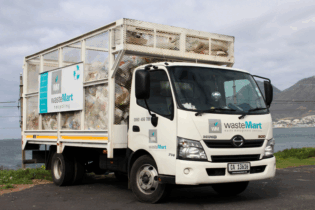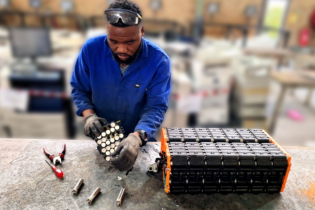The South African Biogas Industry Association (SABIA) will be launched at the Africa Energy Indaba in February 2013 by experts who believe that biogas should no longer be lumped together with other alternative energy sources, but holds enough weight to stand in its own category.
“Previously, the only incentive available for investing in biogas energy was that you could get preferential interest rates from the Industrial Development Corporation (IDC),but Eskom and the Department of Trade and Industry (DTI) recently introduced a rebate scheme and a grant incentive respectively that have substantially improved the financial viability of biogas projects in South Africa” explains Mark Tiepelt, the chairman of SABIA. SABIA believes that biogas has long been overshadowed by other forms of renewable energy sources such as solar, wind and hydro. Commissioning a biogas plant however not only turns organic waste into electricity, but also has the added benefit of producing thermal energy through capturing of excess heat from the generator (CHP) which turns the often environmentally hazardous waste into usable organic compost and has the potential to change the carbon status of the operation to being carbon neutral. The methane can also be used as vehicular fuel to run cars, taxis and busses. On a domestic level, biogas is used worldwide for cooking purposes, for lighting and to heat water. “I believe biogas has the potential to create an entire new industry in SA with a market potential in excess of R10billion. Conservatively calculated the industry can produce in the region of 2.5GW of electricity and create thousands of job opportunities at the same time” says Tiepelt. A civil engineer by training, he has been running his own biogas digester on his smallholding in Muldersdrift for the past four years and during this time has never purchased LPG gas to cook with. His digester is fed with the raw sewerage from the property, kitchen waste and also manure from the horse stables in the area. Tiepelt believes that the time has come for biogas to takes it rightful place in the renewable energy sector in South Africa and to ‘play catch-up’ to other countries such as India that has more than 12 million rural biogas plants. This is the game changer that the biogas industry needs. South Africa lags behind the rest of the developed and developing world when it comes to using biogas for energy. In South Africa there are approximately 200 small scale biogas digesters, mostly installed by NGO’s. “Germany, as an example, has built 7000 biogas plants over the past 15 years and currently builds a new biogas plant every 8 hours. South Africa is where Germany was 15 years ago and is likely to see increasing investment in many biogas plants,” says Raoul Goosen from the IDC’s Green Industries Business Unit. The unit has recently funded some of the first South African biogas plants and Goosen says the “IDC is committed to assisting further development of South Africa’s nascent biogas industry, leading to cleaner and more efficient businesses that currently generate waste”. Producing energy from biogas makes sense for big scale commercial operations like agricultural concerns, dairies, piggeries, fruit and vegetable farmers, manufacturers, food processing plants, wine estates and breweries, to name a few. These are the low-hanging fruit – companies or industries that are already working with organic material, or have organic material as a by-product and have enough space to install biogas plants at their operations.Jonathan de Magalhaes is the managing director of Ubuntu Energy Solutions, a company that looks at all renewable energy solutions that are available, and then recommends “the right solution” for their customers. “If you look at abattoirs and farm lands, the waste that they generate incurs a cost to their companies to get rid of, but with biogas you’re using that waste to generate energy, and after the process, you are left with what is a suitable organic compost because biogas turns harmful waste into an organic fertilizer and also removes harmful pathogens in the process without taking away your nutritional value of the material,” says de Magalhaes.
With Eskom’s announcement in July 2012 that its rebate programme will now extend to small scale renewable projects, it’s more viable for companies than ever before to invest in the renewable energy sector in South Africa. “As biogas can be stored, the electricity produced can be used at will, especially during peak hours where there is the biggest demand – this is not the case with solar and wind generated electricity that can only be produced when the sun shines or the wind blows,” says Tiepelt. In addition to Eskom’s rebate programme, biogas investors can also approach the DTI for grant funding through their manufacturing incentive scheme (MCEP). With both Eskom rebate and MCEP grant, there are certain criteria related to BBBEE standing, job creation, local content, etc. The MCEP grant will be applicable to companies that have a manufacturing component to its operation. As an example dairy farmer who delivers its milk to a central dairy will not qualify for MCEP, they will however qualify if the pasteurize and bottle their milk on the premises. Dr Joël Houdet, Managing Director of Integrated Sustainability Services, another company that specialises in renewable energy solutions for its clients, says, “Biogas is a powerful tool to reduce your costs (energy, waste treatment) and environmental impacts simultaneously. Through reductions in carbon emissions, decreases in tax liabilities could become an additional benefit should the much-debated SA carbon tax materialise.” The biogas industry has the potential to explode in the future, but Tiepelt cautions that the opportunities need to be utilised now.“The Eskom rebate won’t be around forever, and moreover, it’s going to become harder in the future in terms of the criteria and the restrictions placed on qualifying.”





